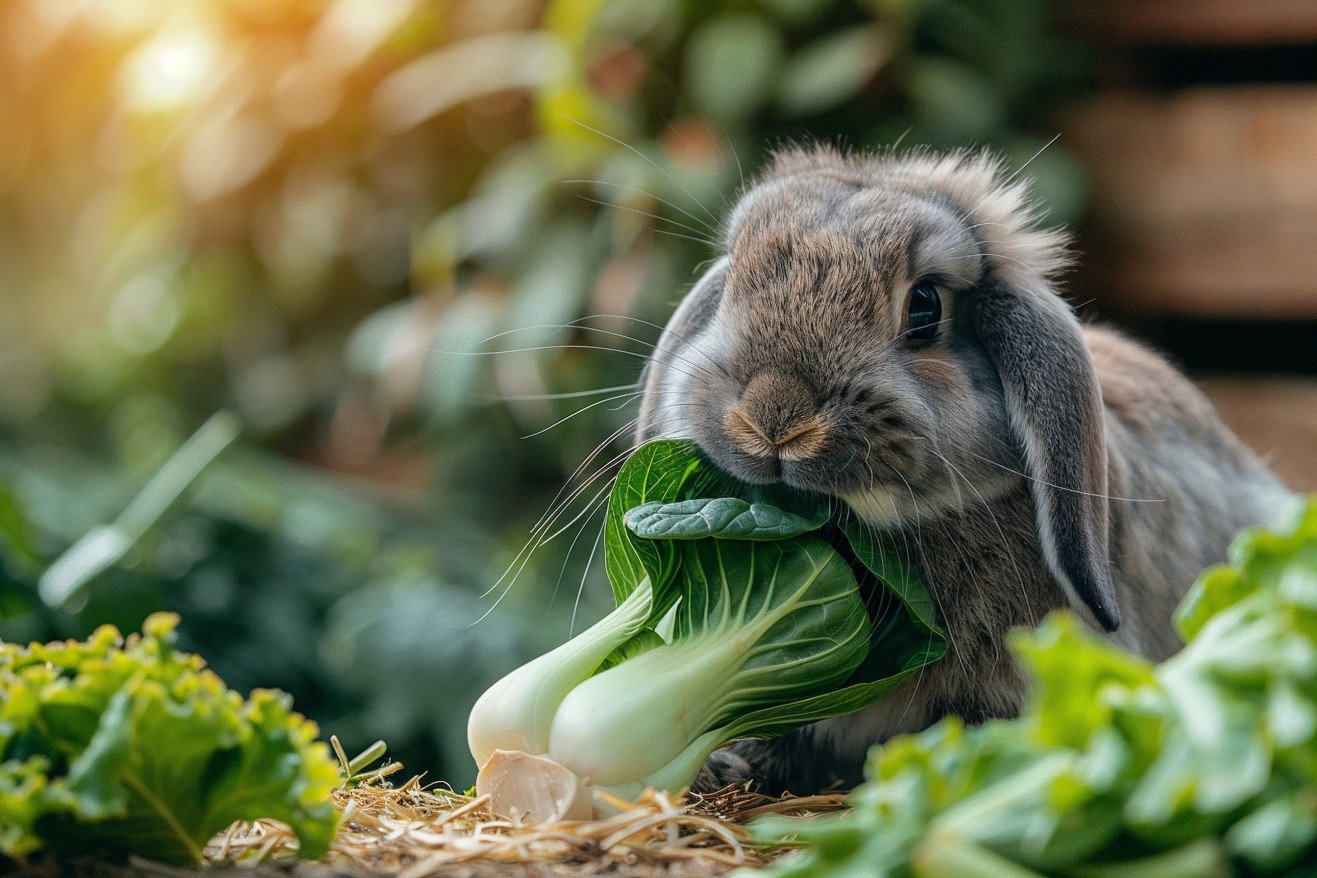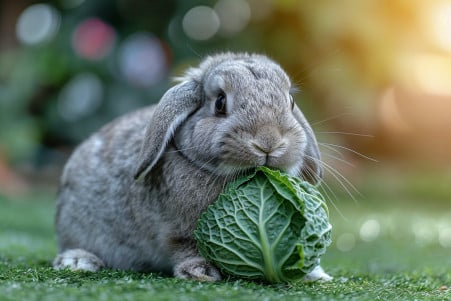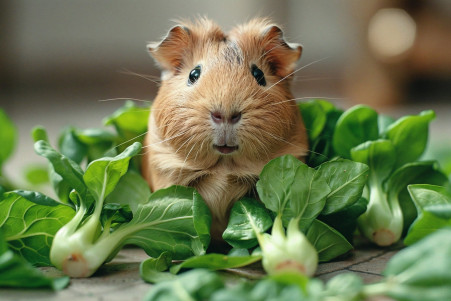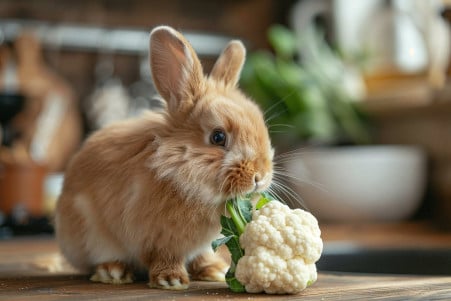Can Rabbits Have Bok Choy? How to Feed Your Rabbit This Vegetable Safely
31 May 2024 • Updated 29 May 2024

If you're a rabbit owner, you may be wondering whether or not you can share some of your bok choy with your furry friend. Bok choy is a great vegetable to add to a rabbit's diet. It's hydrating and packed with important nutrients like vitamins A, C, and K, as well as calcium, iron, and antioxidants, and it's low in calories and fat.
However, while bok choy has a lot to offer, it's important to know how much to give your rabbit and the best way to introduce it into their diet. In this article, we'll cover advice from veterinarians and experienced rabbit owners to help you understand the best feeding strategies and any risks or special considerations associated with feeding your rabbit this cruciferous vegetable. By the time you're done, you'll feel comfortable adding bok choy to your rabbit's diet as part of a healthy, well-rounded meal plan.
Can rabbits eat bok choy?
Proper Portions: How Much Bok Choy Can Rabbits Eat?
As with any new food, it’s important to be mindful of portion sizes when adding bok choy to your rabbit’s diet. According to rabbit care guidelines, a good rule of thumb is to feed 1 cup of vegetables for every 4 lbs of body weight per day. In the case of bok choy, the recommendation is that it should account for no more than 1/3 of the total leafy greens that your rabbit eats each day, according to Arizona Exotics' rabbit resources.
When you first start feeding your rabbit bok choy, it’s best to start with small servings and watch for signs of digestive upset, such as soft stools or diarrhea, as recommended by The Rabbit Haven. Since every rabbit is different, it’s important to adjust portion sizes based on your rabbit’s response. It’s also important to make sure that you’re feeding your rabbit a variety of leafy greens, so make sure to switch up the bok choy with other options to ensure that your rabbit is getting a well-rounded diet and to prevent them from eating too much of one type of green.
By starting small, watching how your rabbit reacts, and making sure that you’re feeding your rabbit bok choy in moderation as part of a well-rounded mix of greens, you can make sure that your rabbit is getting the benefits of this nutritious food. When fed in the right amounts, bok choy can be a fun addition to your rabbit’s diet that keeps their meals exciting and healthy.
How Much Bok Choy Should a Rabbit Have?
Bok choy should be given as part of a balanced diet that includes hay, pellets, and other vegetables, according to The Educated Rabbit. Hay should make up the majority (70%) of a rabbit's diet, with pellets (20%) and vegetables (10%) supplementing it, according to Oxbow Animal Health.
By rotating different leafy greens, including bok choy, you can ensure that your rabbit gets a good mix of nutrients, according to Rabbit.org. However, some vegetables, including iceberg lettuce and raw onions, should be avoided because they can cause health problems, according to The Rabbit Welfare Association & Fund.
It's important to pay attention to your rabbit's diet and adjust it as necessary to make sure that you're meeting their individual needs and tastes. By making sure that bok choy is part of a balanced diet, you can make sure that your rabbit gets the nutrients they need without any of the drawbacks.
The Pros and Cons: What to Know About the Benefits and Risks of Bok Choy
Bok choy is packed with vitamins, minerals, and antioxidants, which can offer a number of health benefits to rabbits. Per Rabbit Care Tips, bok choy is a good source of vitamin A, vitamin C, and vitamin K. It also has low levels of oxalates and calories, which makes it a healthier option than other leafy greens like spinach.
That said, Rabbit Care Tips warns that bok choy’s high calcium content can lead to bladder sludge or stones if it’s consumed in high quantities. Meanwhile, the stems and cores of bok choy can lead to gas and digestive issues in some rabbits, according to the Rabbits World resource.
As with many rabbit foods, it’s important to feed bok choy in moderation to avoid potential health problems. The Open Sanctuary Project only notes that bok choy is an appropriate daily vegetable for rabbits, but doesn’t delve into the potential risks or benefits. As a result, it’s important to keep a close eye on your rabbit when you first introduce bok choy and adjust the serving size as needed.
How to Feed Bok Choy to Your Rabbit
Bok choy can be served raw or cooked, depending on your rabbit's taste, notes VCA Animal Hospitals. Make sure to wash the bok choy thoroughly to remove any dirt or pesticides. Then, cut or tear the leaves and stems into bite-sized pieces.
Since the stems of bok choy can be a bit fibrous, some rabbits may not like them, so you may want to separate the leaves and stems, advises BinkyBunny. However, always introduce new ways of preparing bok choy slowly and watch how your rabbit reacts to cooked and raw bok choy to see if they have a preference.
If you follow these steps, you can make sure that you're feeding your rabbit bok choy in a way that will allow them to enjoy this nutritious vegetable as part of a well-rounded diet.
Conclusion: How to Add Bok Choy to Your Rabbit's Diet
Rabbit owners should be careful when feeding cruciferous vegetables like bok choy, which can cause gas in rabbits, according to Rabbit.org. Many cruciferous vegetables are also high in calcium, which can lead to health problems in rabbits. As a result, most rabbit owners rotate the vegetables they feed their pets and take care to give them a break between servings of high-calcium vegetables.
Rabbits should be fed a diet that consists primarily of timothy hay, along with 1-3 cups of leafy green vegetables and 1/4-1/2 cup of fortified pellets daily, according to Bunny Lady. In general, it's best to feed rabbits three different types of leafy green vegetables each day, while avoiding leafy greens that are high in oxalic acid and iceberg lettuce.
When feeding new foods like bok choy, it's important to start with a small amount and watch your rabbit carefully to see how they react. By introducing new foods gradually and watching your pet's response, you can help ensure that their digestive system can handle the new food.


